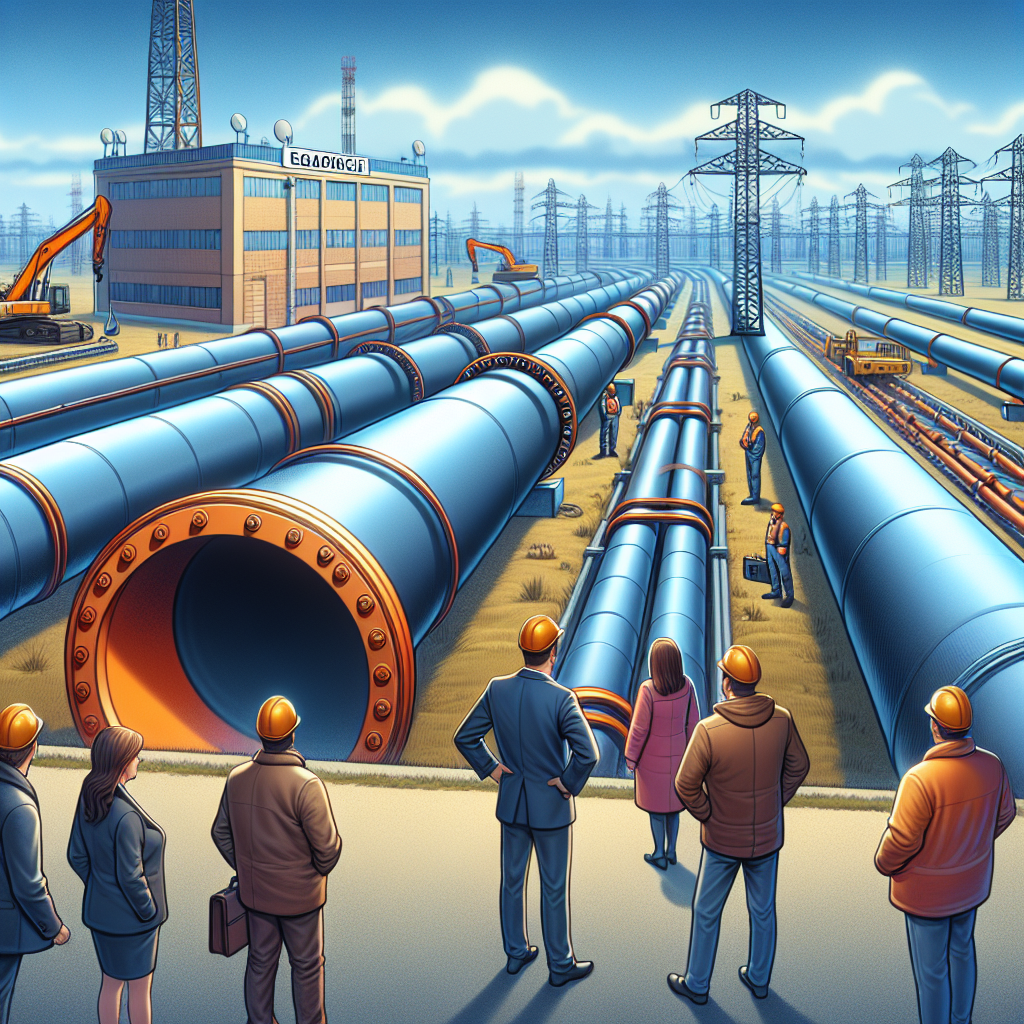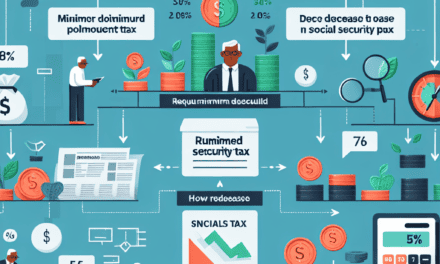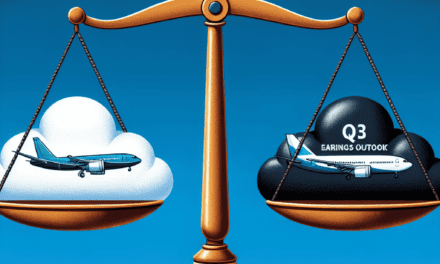“Energy Freeze: Gazprom Cuts Off Austria’s Gas Lifeline”
Introduction
In a significant development affecting European energy markets, Gazprom, the Russian state-controlled energy giant, has ceased its natural gas deliveries to Austria, as reported by the Austrian energy company OMV. This abrupt halt in supply underscores the growing tensions and uncertainties surrounding energy security in Europe, particularly in the context of geopolitical dynamics and the continent’s reliance on Russian gas. The suspension of gas flow to Austria, a key transit hub for Russian gas to Western Europe, raises concerns about potential disruptions in energy supply and the broader implications for European energy policy and economic stability.
Impact Of Gazprom’s Supply Halt On Austria’s Energy Security
The recent decision by Gazprom to halt natural gas supplies to Austria has sent ripples through the energy sector, raising significant concerns about Austria’s energy security. OMV, Austria’s leading energy utility, reported this development, which underscores the intricate dynamics of energy dependency and geopolitical influences. As Austria heavily relies on natural gas imports to meet its energy demands, the cessation of supplies from Gazprom, a major Russian energy corporation, poses a substantial challenge to the country’s energy stability.
To understand the implications of this supply halt, it is essential to consider Austria’s energy landscape. Natural gas constitutes a significant portion of Austria’s energy mix, with a considerable percentage sourced from Russia. This dependency has historically been a point of vulnerability, as geopolitical tensions can directly impact supply chains. The halt in supply from Gazprom, therefore, not only disrupts immediate energy availability but also raises questions about the long-term sustainability of Austria’s energy strategy.
In response to this development, Austria must explore alternative energy sources and diversify its supply channels. The European Union has long advocated for energy diversification to reduce dependency on single suppliers, particularly in light of geopolitical uncertainties. Austria, as a member state, is now compelled to accelerate its efforts in this direction. This may involve increasing imports from other countries, investing in renewable energy sources, and enhancing energy efficiency measures to reduce overall consumption.
Moreover, the halt in natural gas supply from Gazprom could have broader economic implications. Energy prices are likely to experience volatility, affecting both consumers and industries. Higher energy costs can lead to increased production expenses for businesses, potentially impacting their competitiveness in the global market. For consumers, rising energy bills may strain household budgets, necessitating government intervention to mitigate the impact on vulnerable populations.
In light of these challenges, Austria’s government and energy stakeholders must collaborate to develop a comprehensive energy security strategy. This strategy should prioritize resilience and adaptability, ensuring that Austria can withstand future disruptions in energy supply. Investments in infrastructure, such as storage facilities and interconnectors with neighboring countries, could enhance Austria’s ability to manage supply fluctuations. Additionally, fostering innovation in renewable energy technologies could reduce reliance on fossil fuels and contribute to a more sustainable energy future.
Furthermore, the halt in Gazprom’s supply serves as a reminder of the interconnectedness of global energy markets. Austria’s situation is not isolated; other European countries may also face similar challenges, highlighting the need for regional cooperation. By working together, European nations can share resources, knowledge, and technologies to bolster collective energy security. Initiatives such as joint procurement agreements and cross-border energy projects could enhance resilience and reduce vulnerability to external shocks.
In conclusion, Gazprom’s decision to halt natural gas supplies to Austria presents a significant challenge to the country’s energy security. This development underscores the importance of diversifying energy sources and reducing dependency on single suppliers. As Austria navigates this complex landscape, it must prioritize resilience, adaptability, and regional cooperation to ensure a stable and sustainable energy future. By doing so, Austria can mitigate the immediate impacts of the supply halt while positioning itself for long-term energy security in an increasingly uncertain world.
Austria’s Response To The Gazprom Supply Disruption
Austria has found itself navigating a complex energy landscape following the recent announcement by Gazprom, the Russian energy giant, that it has halted natural gas supplies to the country. This development, reported by OMV, Austria’s leading oil and gas company, has prompted a swift and strategic response from Austrian authorities and energy stakeholders. As the nation grapples with the implications of this supply disruption, it is crucial to understand the measures being implemented to mitigate potential impacts on the economy and the daily lives of Austrian citizens.
In the immediate aftermath of Gazprom’s decision, the Austrian government has prioritized securing alternative energy sources to ensure a stable supply of natural gas. This involves intensifying negotiations with other international suppliers and exploring opportunities to increase imports from neighboring countries. By diversifying its energy portfolio, Austria aims to reduce its dependency on Russian gas and enhance its energy security. This strategic pivot is not only a response to the current crisis but also a long-term objective to safeguard the nation against future supply disruptions.
Moreover, Austria is accelerating its efforts to transition towards renewable energy sources. The government has reaffirmed its commitment to the European Union’s Green Deal, which emphasizes the importance of sustainable energy solutions. By investing in wind, solar, and hydroelectric power, Austria seeks to decrease its reliance on fossil fuels and move towards a more resilient and environmentally friendly energy system. This transition, while ambitious, is seen as a necessary step in ensuring energy independence and sustainability in the face of geopolitical uncertainties.
In addition to securing alternative energy sources, Austria is also focusing on enhancing its energy efficiency. The government has launched initiatives aimed at reducing energy consumption across various sectors, including industry, transportation, and residential areas. By promoting energy-saving technologies and practices, Austria hopes to alleviate some of the pressure on its energy supply and reduce the overall demand for natural gas. These measures are complemented by public awareness campaigns that encourage citizens to adopt more energy-efficient habits in their daily lives.
Furthermore, Austria is leveraging its strategic gas storage facilities to buffer against the immediate effects of the supply halt. These storage sites, which have been filled to capacity in anticipation of potential disruptions, provide a temporary cushion that allows the country to maintain a steady supply of natural gas in the short term. This strategic reserve is a critical component of Austria’s energy strategy, offering a degree of flexibility and resilience as the nation navigates the current crisis.
While the halt in natural gas supply from Gazprom presents significant challenges, it also serves as a catalyst for Austria to accelerate its energy transition and strengthen its energy security. The government’s proactive measures, coupled with the support of industry stakeholders and the public, underscore Austria’s commitment to overcoming this disruption and emerging more resilient than before. As the situation continues to evolve, Austria remains focused on ensuring a stable and sustainable energy future for its citizens, demonstrating both adaptability and determination in the face of adversity.
Economic Implications Of The Natural Gas Supply Cut
The recent announcement by Gazprom to halt natural gas supplies to Austria, as reported by OMV Utility, has sent ripples through the European energy market, raising concerns about the economic implications of such a move. This development comes at a time when Europe is grappling with energy security challenges, exacerbated by geopolitical tensions and the ongoing transition to renewable energy sources. The cessation of natural gas supplies from Gazprom, a major player in the global energy sector, underscores the vulnerability of European countries that rely heavily on Russian gas imports to meet their energy needs.
The immediate economic impact of this supply cut is likely to be felt in the form of increased energy prices. Natural gas is a critical component of Austria’s energy mix, and any disruption in its supply can lead to a surge in prices, affecting both consumers and industries. Higher energy costs can translate into increased production costs for businesses, which may, in turn, lead to higher prices for goods and services. This inflationary pressure could strain household budgets and reduce consumer spending, potentially slowing down economic growth.
Moreover, the halt in natural gas supplies could have significant implications for Austria’s energy security. As the country seeks to diversify its energy sources and reduce its dependence on Russian gas, it may need to accelerate investments in alternative energy infrastructure. This could involve expanding renewable energy projects, such as wind and solar power, and enhancing energy efficiency measures. While these initiatives are crucial for long-term sustainability, they require substantial financial resources and time to implement, posing short-term challenges for the Austrian economy.
In addition to domestic repercussions, the supply cut may have broader implications for the European Union’s energy strategy. The EU has been striving to reduce its reliance on Russian energy imports, a goal that has gained urgency in light of recent geopolitical developments. The Gazprom supply halt to Austria could serve as a catalyst for the EU to intensify its efforts to secure alternative energy sources and strengthen its energy resilience. This may involve increasing liquefied natural gas (LNG) imports from other regions, enhancing cross-border energy infrastructure, and fostering greater cooperation among member states to ensure a stable and diversified energy supply.
Furthermore, the situation highlights the interconnectedness of global energy markets and the potential for supply disruptions to have far-reaching consequences. As countries around the world navigate the complexities of energy transition and geopolitical dynamics, the need for a coordinated and strategic approach to energy security becomes increasingly apparent. This includes not only diversifying energy sources but also investing in technologies that enhance energy storage and grid stability.
In conclusion, Gazprom’s decision to halt natural gas supplies to Austria presents significant economic challenges, both domestically and across the European Union. The immediate impact on energy prices and security underscores the urgency of diversifying energy sources and enhancing resilience. As Austria and the EU navigate this complex landscape, strategic investments in renewable energy and infrastructure will be crucial to mitigating the economic implications of such supply disruptions. Ultimately, this situation serves as a reminder of the importance of a robust and adaptable energy strategy in an increasingly interconnected and volatile global market.
Alternative Energy Sources For Austria Amid Gazprom’s Halt

In light of Gazprom’s recent decision to halt natural gas supplies to Austria, as reported by the Austrian utility company OMV, the nation faces a pressing need to explore alternative energy sources. This development underscores the vulnerability of relying heavily on a single supplier for energy needs, particularly in a geopolitical landscape that is increasingly unpredictable. Consequently, Austria must accelerate its transition towards more sustainable and diversified energy solutions to ensure energy security and economic stability.
To begin with, Austria has already made significant strides in renewable energy, particularly in harnessing hydropower. The country is endowed with abundant water resources, which have been effectively utilized to generate a substantial portion of its electricity. Hydropower not only provides a reliable and clean energy source but also reduces dependency on imported fossil fuels. However, while hydropower remains a cornerstone of Austria’s energy strategy, it is imperative to expand the energy mix further to mitigate risks associated with supply disruptions.
In addition to hydropower, wind energy presents a viable alternative. Austria’s geographical landscape, characterized by its mountainous regions and open plains, offers considerable potential for wind energy development. By investing in wind farms and enhancing grid infrastructure, Austria can significantly increase its wind energy capacity. This would not only contribute to energy diversification but also align with the European Union’s broader goals of reducing carbon emissions and promoting sustainable energy practices.
Moreover, solar energy is another promising avenue for Austria. Technological advancements have made solar panels more efficient and affordable, making it feasible for both residential and commercial applications. Encouraging the adoption of solar energy through incentives and subsidies could stimulate local economies and create jobs, while simultaneously reducing reliance on external energy sources. Furthermore, integrating solar energy with existing hydropower and wind systems could provide a balanced and resilient energy portfolio.
Transitioning to alternative energy sources also necessitates improvements in energy storage and grid management. As renewable energy sources are often intermittent, developing robust energy storage solutions is crucial to ensure a stable supply. Austria could invest in battery technologies and explore innovative storage methods such as pumped hydro storage, which complements its existing hydropower infrastructure. Additionally, modernizing the national grid to accommodate a diverse range of energy inputs will be essential for efficient energy distribution and consumption.
Furthermore, Austria can look towards regional cooperation to enhance its energy security. By collaborating with neighboring countries, Austria can participate in shared energy projects and cross-border energy trading. This would not only provide access to a broader energy market but also foster regional stability and economic integration. Such cooperation could be facilitated through existing frameworks within the European Union, which aims to create a unified and resilient energy market.
In conclusion, Gazprom’s halt of natural gas supplies to Austria serves as a catalyst for the nation to intensify its pursuit of alternative energy sources. By leveraging its natural resources and investing in renewable technologies, Austria can build a more sustainable and secure energy future. This transition, while challenging, offers an opportunity to reduce carbon emissions, stimulate economic growth, and enhance national resilience against external energy shocks. As Austria navigates this critical juncture, a comprehensive and forward-thinking energy strategy will be paramount in ensuring long-term prosperity and environmental stewardship.
The Role Of OMV Utility In Managing The Gas Supply Crisis
In recent developments, the Austrian energy sector has been thrust into the spotlight as Gazprom, the Russian state-controlled energy giant, has halted its natural gas supply to Austria. This unexpected move has placed OMV Utility, Austria’s leading oil and gas company, at the forefront of managing the ensuing crisis. As the primary entity responsible for ensuring the stability and reliability of Austria’s energy supply, OMV Utility is now tasked with navigating the complexities of this supply disruption.
The cessation of natural gas deliveries from Gazprom has significant implications for Austria, a country that relies heavily on Russian gas to meet its energy needs. In this context, OMV Utility’s role becomes crucial, as it must swiftly implement strategies to mitigate the impact of this supply interruption. To address the immediate shortfall, OMV is exploring alternative sources of natural gas, including increased imports from neighboring countries and tapping into existing reserves. This approach not only aims to stabilize the current supply but also seeks to reassure consumers and industries that their energy needs will continue to be met.
Moreover, OMV Utility is actively engaging with the Austrian government and other stakeholders to develop a comprehensive response plan. This collaboration is essential to ensure a coordinated effort in managing the crisis and to explore long-term solutions that enhance Austria’s energy security. By working closely with policymakers, OMV is advocating for measures that diversify the country’s energy portfolio, thereby reducing its dependence on any single supplier. This strategic shift is expected to involve investments in renewable energy sources and infrastructure improvements that facilitate the integration of alternative energy supplies.
In addition to these immediate actions, OMV Utility is also focusing on enhancing its communication with the public. Transparent and timely information dissemination is vital to maintaining public confidence during such uncertain times. By keeping consumers informed about the steps being taken to address the gas supply issue, OMV aims to alleviate concerns and prevent panic. This communication strategy is complemented by efforts to promote energy conservation among consumers, encouraging them to adopt practices that reduce overall demand and ease the pressure on existing supplies.
Furthermore, the current situation underscores the importance of regional cooperation in energy matters. OMV Utility is leveraging its relationships with other European energy companies to explore collaborative solutions that can benefit all parties involved. This includes sharing resources, knowledge, and best practices to enhance the resilience of the energy supply chain across the continent. Such cooperation is particularly crucial in light of the broader geopolitical tensions that have contributed to the current crisis.
In conclusion, the halt in natural gas supply from Gazprom presents a formidable challenge for Austria, but it also serves as a catalyst for change. OMV Utility’s proactive approach in managing the crisis highlights its pivotal role in ensuring energy security for the nation. By diversifying energy sources, fostering regional cooperation, and maintaining transparent communication, OMV is not only addressing the immediate crisis but also laying the groundwork for a more resilient and sustainable energy future. As Austria navigates this complex landscape, the lessons learned from this experience will undoubtedly shape its energy policies and strategies for years to come.
European Energy Market Reactions To Gazprom’s Decision
The recent decision by Gazprom to halt natural gas supplies to Austria has sent ripples through the European energy market, prompting a range of reactions from stakeholders across the continent. This development, reported by the Austrian utility company OMV, underscores the ongoing volatility in energy supply dynamics, particularly in the context of Europe’s reliance on Russian gas. As the continent grapples with this sudden disruption, the implications for energy security, market stability, and geopolitical relations are becoming increasingly apparent.
To begin with, the immediate impact of Gazprom’s decision is being felt acutely in Austria, a country that has historically depended on Russian gas to meet a significant portion of its energy needs. The cessation of supply has raised concerns about potential shortages, especially as the colder months approach. In response, OMV and other Austrian energy stakeholders are exploring alternative sources and strategies to mitigate the impact. This includes increasing imports from other countries, enhancing storage capabilities, and accelerating the transition to renewable energy sources. However, these measures may take time to implement fully, leaving Austria in a precarious position in the short term.
Beyond Austria, the halt in gas supply has reverberated across the broader European energy market. Countries that are interconnected through the European gas network are closely monitoring the situation, as any prolonged disruption could have cascading effects on supply and prices. The European Union, which has been striving to reduce its dependency on Russian energy, views this development as a stark reminder of the need to diversify energy sources and enhance energy resilience. Consequently, there is likely to be renewed emphasis on initiatives such as the European Green Deal, which aims to transition the continent towards more sustainable energy solutions.
Moreover, Gazprom’s decision has geopolitical ramifications that extend beyond the immediate energy market concerns. The move is perceived by some analysts as a strategic maneuver by Russia to exert pressure on Europe amidst ongoing geopolitical tensions. This has prompted discussions among European leaders about the need for a unified response to safeguard energy security and maintain diplomatic leverage. In this context, the role of international partnerships and alliances becomes crucial, as Europe seeks to navigate the complex interplay of energy supply, economic interests, and geopolitical considerations.
In addition to the geopolitical and market implications, the halt in gas supply has also sparked discussions about the long-term sustainability of Europe’s energy strategy. The current situation highlights the vulnerabilities inherent in relying heavily on a single supplier, particularly one that is subject to geopolitical fluctuations. As a result, there is likely to be increased investment in renewable energy infrastructure, energy efficiency measures, and technological innovations aimed at reducing dependency on fossil fuels. This shift not only aligns with Europe’s climate goals but also enhances its energy autonomy and resilience.
In conclusion, Gazprom’s decision to halt natural gas supplies to Austria has triggered a multifaceted response from the European energy market. While the immediate focus is on addressing potential shortages and ensuring energy security, the broader implications for market stability, geopolitical relations, and long-term energy strategy are equally significant. As Europe navigates this challenging landscape, the emphasis on diversification, sustainability, and international cooperation will be key to shaping a resilient and secure energy future.
Long-term Strategies For Austria To Reduce Dependency On Russian Gas
In recent developments, Gazprom, the Russian energy giant, has ceased its natural gas supply to Austria, as reported by the Austrian utility company OMV. This unexpected halt has underscored the urgent need for Austria to reassess its energy strategies and reduce its dependency on Russian gas. Historically, Austria has relied heavily on Russian natural gas, a relationship that has been mutually beneficial but fraught with geopolitical risks. The current situation presents an opportunity for Austria to explore long-term strategies that can ensure energy security and sustainability.
To begin with, diversifying energy sources is paramount. Austria can look towards increasing its imports from other countries, such as Norway or Algeria, which are known for their stable energy supplies. Additionally, the development of liquefied natural gas (LNG) infrastructure could enable Austria to import gas from more distant markets, including the United States and Qatar. By expanding its supplier base, Austria can mitigate the risks associated with over-reliance on a single country.
Moreover, investing in renewable energy sources is a crucial step towards reducing dependency on fossil fuels. Austria is already a leader in hydropower, which accounts for a significant portion of its electricity generation. However, there is potential to further expand into other renewable sectors such as wind, solar, and biomass. By increasing the share of renewables in its energy mix, Austria can not only reduce its reliance on imported gas but also contribute to global efforts in combating climate change.
In addition to diversifying energy sources, enhancing energy efficiency is another vital strategy. Austria can implement policies that encourage both industries and households to adopt energy-saving technologies and practices. This could include incentives for retrofitting buildings with better insulation, promoting the use of energy-efficient appliances, and supporting research and development in energy-efficient technologies. By reducing overall energy consumption, Austria can lessen its dependence on external energy supplies.
Furthermore, regional cooperation within the European Union can play a significant role in Austria’s energy strategy. By collaborating with neighboring countries, Austria can participate in joint energy projects and share resources, such as cross-border electricity grids and gas pipelines. The European Union’s commitment to energy solidarity and security can provide a framework for Austria to enhance its energy resilience.
Additionally, Austria can explore the potential of hydrogen as an alternative energy source. Hydrogen, particularly green hydrogen produced from renewable sources, offers a promising solution for reducing carbon emissions and dependency on natural gas. By investing in hydrogen technology and infrastructure, Austria can position itself at the forefront of this emerging energy sector.
Finally, it is essential for Austria to engage in diplomatic efforts to stabilize its energy relations. While reducing dependency is crucial, maintaining a balanced and pragmatic approach in its dealings with Russia and other energy suppliers can help ensure a steady transition. Diplomatic channels can be used to negotiate terms that are favorable and secure for Austria’s energy needs.
In conclusion, the halt in natural gas supply from Gazprom serves as a wake-up call for Austria to implement long-term strategies aimed at reducing its dependency on Russian gas. By diversifying energy sources, investing in renewables, enhancing energy efficiency, fostering regional cooperation, exploring hydrogen potential, and engaging in diplomatic efforts, Austria can build a resilient and sustainable energy future. These strategies not only address immediate concerns but also align with broader goals of energy security and environmental responsibility.
Q&A
1. **What happened with Gazprom and Austria?**
Gazprom halted its natural gas supply to Austria.
2. **Who reported the halt in gas supply?**
The halt was reported by OMV, an Austrian utility company.
3. **When did Gazprom stop supplying gas to Austria?**
The specific date of the halt would need to be checked from current news sources.
4. **Why did Gazprom stop supplying gas to Austria?**
The reasons for the halt could include geopolitical tensions, contractual disputes, or technical issues, but specific details would need to be confirmed from recent reports.
5. **How has Austria been affected by the halt in gas supply?**
Austria may face energy shortages, increased energy prices, or need to seek alternative energy sources.
6. **What is OMV’s role in this situation?**
OMV is the utility company in Austria that reported the halt and is likely involved in managing the country’s energy supply and response.
7. **What are potential solutions for Austria following the halt?**
Potential solutions could include increasing imports from other countries, boosting renewable energy production, or implementing energy-saving measures.
Conclusion
The halt of natural gas supply from Gazprom to Austria, as reported by OMV Utility, underscores the vulnerabilities and geopolitical complexities inherent in Europe’s energy supply chain. This disruption highlights the region’s dependency on Russian energy exports and the potential for significant economic and political ramifications. It may accelerate efforts within the European Union to diversify energy sources, enhance energy security, and transition towards renewable energy. Additionally, this situation could strain Austria’s energy market, prompting urgent measures to secure alternative supplies and mitigate potential impacts on consumers and industries.





